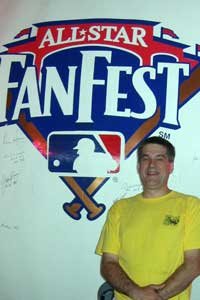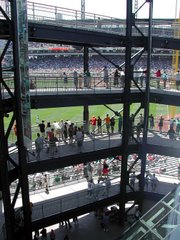I didn't realize he was joking. With Steve Carlton on the mound for the Phillies, coming off his 27 victories for a last-place team the previous season, I figured this would be one popular baseball game.
And even if I ended up hundreds of feet above the playing field, I wouldn't care. This was my first major-league baseball game, and I was going to enjoy it.
As it turned out, there was plenty of room inside the stadium, as the paid attendance was slightly more than 11,000 to see the Phillies play the Mets on April 14, 1973. Facing the mighty Mr. Carlton was New York's Jim McAndrew, a pitcher I'd never heard of before that night.
Carlton pitched a complete game as Philadelphia coasted to a 7-3 win. McAndrew, making his first start of the season, lasted into the sixth in taking the loss.
The 1973 season didn't prove to be a one to remember for either pitcher. Carlton ended up losing 20 games, while McAndrew staggered his way through his sixth and final year with the Mets and was gone from the majors by early '74.
About all I knew of McAndrew was that he was one of a crew of exceptional young pitchers the Mets' farm system developed in the '60s. Tom Seaver and Nolan Ryan went on to the Hall of Fame, while Jerry Koosman and the late Tug McGraw achieved some degree of stardom.
McAndrew was one who didn't, perhaps in part because of his harrowing experiences at the very start of is major-league career.
The native of Lost Nation, Iowa - what a great place name! - was 24 when the Mets called him up from Jacksonville in July 1968. McAndrew must have known he wasn't joining an offensive juggernaut (New York batter his .228 and scored fewer than three runs per game that year), but nothing could have prepared him for what happened when he reached The Show.
In his debut, for example, he pitched exceptionally well, giving up one run on six hits and no walks by facing the defending World Series champion Cardinals. On the mound for St. Louis, though, was Bob Gibson, who was in the midst of a stretch of surrendering two runs in 100 innings (sic) on his way to a 1.12 ERA for the season. Gibson scattered seven singles, walked none and struck out 13 while posting one of his baker's dozen complete-game shutouts in '68.
The Mets gave McAndrew his next start two weeks later, against the Dodgers. He didn't pitch as well, giving up nine hits before manager Gil Hodges yanked him in the fifth inning. The two runs Los Angeles scored were plenty enough for mound opponent Mike Kekich, who pitched a one-hit shutout, striking out 11.
On Aug. 10, McAndrew faced the Giants. His one mistake was giving up a single to Bob Barton, which scored Jesus Alou from second. San Francisco's Bob Bolin, meanwhile, pitched a six-hit shutout and struck out nine in the 1-0 win.
A week later, it was McAndrew's turn against Houston, which was fighting the Mets for eighth place in the NL standings. McAndrew's only gaffe was hanging a ball that Jim "The Toy Cannon" Wynn hit out of the park in the top of the sixth. Houston's Don Wilson and John Buzhardt combined to give up four hits in the 1-0 victory.
To that point, McAndrew had compiled a 1.82 ERA, but was 0-4, with the Mets scoring exactly zero runs in any game in which he'd pitched.
So one couldn't blame him for being more than slightly frazzled when he took the mound again on Aug. 21 for a rematch with San Francisco, which had two future Hall of Famers, Willies Mays and McCovey, in the lineup and another, Juan Marichal, as the opposing pitcher.
This time around, the Mets actually scored on McAndrew's behalf, with Larry Stahl's home run in the third and Ed Kranepool's single later in the inning staking New York out to a 2-1 lead.
Perhaps the shock of seeing his team actually score was too much for Jim. After giving up Mays' 580th career home run, which put the Giants up 6-2, Hodges dismissed McAndrew, and the Mets were on their way to a 13-3 defeat. His record: 0-5, 3.38 ERA.
By then, McAndrew might have been hoping for a bus ticket back to Jacksonville, but Hodges put him out there again St. Louis on Aug. 26, vs. yet another pitcher on his way to Cooperstown: Carlton, the same guy he'd face in my first game.
In the '68 contest, Carlton shut out the Mets for the first seven innings, but the Cardinals had no success against McAndrew, either. In the eighth, Tommie Agee (on his way to a .217 season with a whopping 17 RBI) led off by bouncing a single to left field. Phil "Harmonica" Linz sacrificed Agee to second. Apparently, Carlton hadn't developed his killer pickoff move at that point in his career, and Agee stole third. Cleon Jones then hit a fly ball deep enough for Agee to cross the plate.
Knowing that probably was all he'd get in the run department, McAndrew mowed down the final six Cardinals, with Roger Maris, who'd retire after the season, making the last out.
Finally, McAndrew had a win to go with all those losses. But four days later, Carlton turned the tables and beat McAndrew and the Mets, 2-0. And five days after that, Pittsburgh's Steve Blass won a 2-1 battle over McAndrew, the deciding tally coming on a home run by all-time great Roberto Clemente.
Thus, in his first eight major-league starts, Jim McAndrew compiled a 2.53 ERA, but had a 1-7 record to show for it.
He won his last three decisions in '68, beating Cooperstown-bound Ferguson Jenkins and future All-Stars Ken Holtzman and Rick Wise. McAndrew finished 1968 at 4-7 with a 2.28 ERA.
The Mets' pitching staff was loaded in '69, and when McAndrew started the season by getting bombed in his first three starts (including failing to make it out of the second inning against the Montreal Expos in just the team's second game ever), he would up splitting time between the starting rotation and the bullpen.
Despite showing a flash of brilliance in back-to-back shutouts of the Giants (beating Gaylord Perry, yet another future Hall of Famer) and Padres in late August, he generally was nowhere near as effective as he'd been as a rookie.
His best overall season was 1972, when he went 11-8 with a 2.80 ERA for another offensively challenged Mets squad. But after a slow start in '73, he was used sporadically and finished 3-8, scoring his final win on May 13 for a team that ended up going to the World Series.
McAndrew's career ended a year later on yet another team that couldn't hit the ball, the San Diego Padres. Two decades later, he watched son Jamie pitch a couple of seasons with Milwaukee.
Jim McAndrew still seems to be a hero of sorts among the Mets faithful who revere the miracle team of '69 and anyone who was on the squad. Here he is (far right) at a recent Mets fantasy camp, along with former teammates Jerry Grote, Cleon Jones and Al Jackson, along with camp attendee Howie Abrams, whose photograph this is:

Jim is pictured a big smile on his face, which means he may finally have gotten over some of those other guys not scoring any runs for him!
Trivia question 45: Who was the first Kansas City Royals player to win the Rookie of the Year award? Question courtesy of the Society for American Baseball Research; answer at lower right









No comments:
Post a Comment